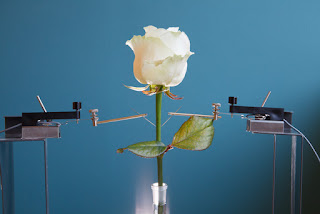 |
| Researchers in Sweden have used roses to create a number of basic electronic devices. (Courtesy: Eliot Gomez/Linköping University) |
Topics: Bioengineering, Biology, Electrical Engineering, Photosynthesis
I have to admit: this would have been a better post around Valentine's Day! Enjoy your turkey, pheasant, Cornish hen (in my case) or vegan meal.
Researchers in Sweden have created electronic circuits and devices that are integrated within living plant material. The team introduced a conductive polymer into the vascular system of plants, which allowed the researchers to create the key components of an electrical circuit. They were also able to demonstrate transistor modulation, digital logic function and elements of a digital display. Plant-integrated electronics could enable us to monitor and regulate plant physiology and harvest energy from photosynthesis, the team says.
Organic electronic materials are polymers and molecules that can conduct and process both electronic and ionic signals. They can be shaped into almost any form and used to build devices that can convert electronic signals into chemical processes, and vice versa. The resulting electrochemical devices can then be used to regulate and monitor biological and chemical processes. Such technologies are currently being exploited in various medical settings, such as drug delivery, regenerative medicine, neuronal interconnects, and diagnostics.
Physics World: Cyborg roses become transistors and logic gates, Michael Allen
Comments